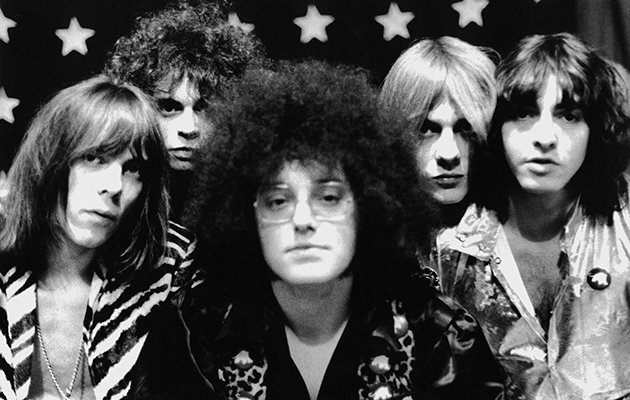Like us on Facebook to keep up to date with the latest news from Uncut
“Right now… right now it’s time to…” The Detroit revolutionaries tell the full story of their immortal “Kick Out The Jams”, and how their use of the M-word got them into a lot of trouble…
Originally published in Uncut’s May 2007 issue
________________________________
Along with Detroit sparring partners The Stooges, The Motor City Five were an anomaly in the peace-and-love hippy climate of the late 1960s. Under the guiding hand of poet and politico John Sinclair, the MC5 mixed the incendiary White Panther ethos of “Rock and roll, dope and fucking in the streets” with high-energy garage rock and Sun Ra riffs.
In addition to their White Panther polemics, MC5 established their own religion, Zenta, and it was on the Zenta New Year in 1968 – Halloween weekend to the rest of us – that the band recorded the Kick Out The Jams album at Detroit’s Grande Ballroom, a former big band agora from the ’40s that became the first psychedelic ballroom outside of San Francisco. The 5 – vocalist Rob Tyner, guitarists Wayne Kramer and Fred “Sonic” Smith, bassist Michael Davis and drummer Dennis Thompson – had gigged there weekly since it opened in 1966, acting as local support for whichever headline act was passing through town. In fact, the phrase “kick out the jams” was originally a heckle, deployed to harass the night’s star attraction if they were turning in a less-than-stellar performance.
That first single, “Kick Out The Jams (Motherfuckers)”, became something of a battlecry back in 1968. And that use of the “M” word got them into a lot of trouble: police raided MC5 shows, record stores were cited for selling their album, and the group was dumped by its record company even as Kick Out The Jams stormed up the charts.
“People come up to me all the time and say, ‘Hey, “Kick Out The Jams” changed my life,’” says Wayne Kramer. “I usually tell them: ‘I’m sorry, I can’t change it back.’”
______________________________
Wayne Kramer (guitar): We picked “…Jams” as a single because it best summed up what we were doing at that moment. Most of that generation of songs, Rob [Tyner] and I wrote in the kitchen at our house near the John C Lodge Expressway in Detroit. We had this kitchen that used to be a dentist’s office. I had a little amp and we would sit there and I’d throw riffs at Rob and chord changes, and he would usually have a couplet or two of lyrics and we’d just try to fit them together. We just tried to knock something out pretty quickly. Which we did. The song came out of bandspeak. Tyner heard the expression and it fitted in with this idea of total commitment, total assault on the culture. So we used the expression to harass other bands. I couldn’t tell you which bands, because we harassed every band we played with. Well, if they were losers, we let them know that. We’d stand by the edge of the stage and holler: “Kick out the jams or get off the stage!”
So it was like an expression, and Tyner crafted that into a tune. He talked later about how he was writing it to us in the band. He was telling us, “Don’t try and change me, let me be who I am.” He was framing it like the story of what happened on a night when we played. We all got in tune. When the dressing room got hazy, it got hazy with reefer smoke. And then we got crazy. And those other lines, Miss McKenzie, that just rhymed good with leaping frenzy. There was no Miss McKenzie. Hate to deflate the thought, but that’s how it is in the songwriting business.
Everybody got credit on the songs because, you know, we were communists. It can work out well, like some bands, REM and I think U2 do that. It’s a way to keep a band together. I think the reason the song lives on is because it seems to sum up that slightly over-the-top enthusiasm that youth have, that 19-year-old punks on a meth power trip have? I say that quoting [legendary rock journalist] Lester Bangs. We were 19 years old and we were punks, but we weren’t on a meth power trip. We were just on a power trip.



